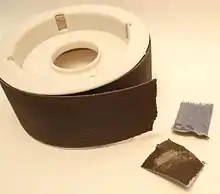Emery cloth
Emery cloth is a type of coated abrasive that has emery glued to a cloth backing. It is used for hand metalworking. It may be sold in sheets or in narrow rolls, typically 25 or 50 mm wide, often described as "emery tape". The cloth backing makes emery cloth stronger in tension than sandpaper, but still allows a sheet to be conveniently torn to size.

Emery paper, more commonly seen, has a paper backing and is usually a finer grit.
Emery was considered a suitable abrasive for fitting work and the final adjustment of steel parts for a perfect fit. It had the advantage that, unlike harder abrasives, it was not considered to embed abrasive traces in the polished components afterwards. Emery was also used for cleaning, as a means of removing rust from polished steel components.
Both emery cloth and paper are still sold in hardware and do it yourself stores, but have been largely supplanted by the increased use of machine grinding to precision size, which has minimized or eliminated the need for hand-fitting; the widespread availability of powered hand tools employing sanding and grinding accessories such as flapwheels; and a shift to other forms of abrasive, such as aluminum oxide, aluminium zirconia and silicon carbide.
Grades
Emery is rated on the average grit size, glued to the backing. Common sizes are, from coarse to fine: 40, 46, 54, 60, 70, 80, 90, 100, 120, 180, 220, 320, F, and FF. A 46 or 54 grade cloth is used on roughly filed work, while 220 to 320 grit cloth will give a good polish.[1]
References
- Oberg, Erik; Jones, Franklin D.; Horton, Holbrook L.; Ryffel, Henry H. (2000). Machinery's Handbook (26th ed.). New York: Industrial Press Inc. p. 1440. ISBN 0-8311-2635-3.
| Wikimedia Commons has media related to Emery cloth. |